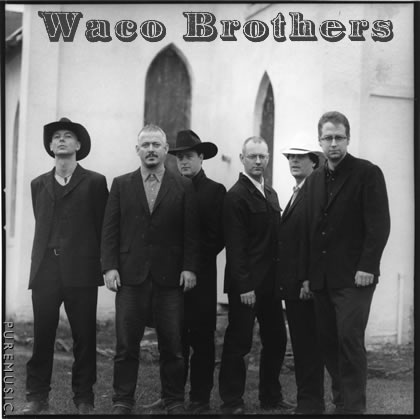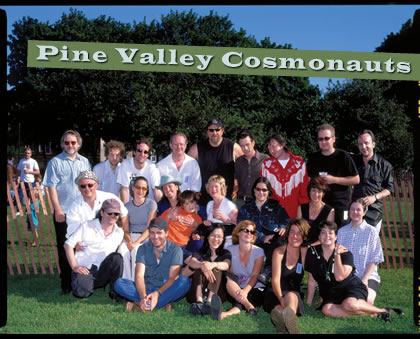
A Conversation with Jon Langford (continued)
PM: Living in Nashville as I do, it's easy to get to thinking that country--even alternative country--is being generated largely here. But everybody knows who looks there that Chicago's got quite a big alternative country scene that you guys are at the center of, although I know in your circles it may be called or may have been called insurgent country.
JL: You know what? We've kind of gotten sick of categorizing.
PM: They all suck, all those words.
JL: It's almost like the Wacos are kind of a thing unto themselves really, now. We've been going quite a long time and the Bloodshot scene has moved on to where what that label does is across a wider spectrum.
PM: What is Bloodshot doing now? What are they about?
JL: Anything they think is good. They don't feel confined to putting out stuff that you would classify as country, really, but having said that, they just put out Justin Earle's new album.
PM: Right. I just reviewed that. I thought that was pretty damned good.
JL: I think his music's great, and he's really great as well.
PM: Very nice cat.
JL: Standing around with him and Mercedes is pretty scary, 'cause they're all so skinny and young and tall.
PM: [laughs] They're all skinny.
JL: Yeah. Makes me feel--I don't know. [laughs]
PM: Oh yeah, none of those characters could put on a pound if they tried. At least not for a few years.

PM: As much as the Wacos and the Mekons gig or record, there's a third outfit. I know that you sometimes record with the Pine Valley Cosmonauts. Although I could tell the story, maybe you'd share something with the readers about that outfit.
JL: Pine Valley Cosmonauts basically was something we put together when we wanted to play other people's music. It's like country music and I think it goes back as early as '94, '95. A German label asked me to make an album with Johnny Cash covers, which I thought was a ridiculous idea and why would I do that.
PM: What label was that?
JL: I don't recall now. Went out of business many years ago--
PM: Right. That's how it goes, yeah.
JL: They asked me to do it, then it became "Well, why shouldn't I do that? Maybe that will be interesting. Maybe there's a way of making this really interesting." So I got Tom Ray and Steve Goulding to get in on it, and we made a funny little record of me singing Johnny Cash songs.
PM: [laughs]
JL: People seemed to like it and it seemed to make sense with what we were doing at the time. It was actually just before you had that kind of revival, so I felt he was very neglected at that time. It was just around the time that Johnny Cash was kind of coming back with the Rick Rubin thing. It was interesting.
Then I got really interested in Bob Wills and I made some little paintings of Bob Wills and I had an art show. We put a band together just to play Bob Wills songs, and Bloodshot said, "Why don't you record them? That sounds great." I said, "Who wants to hear an album with a load of us guys playing Bob Wills stuff?" We made the record and I thought it sounded fantastic. Bob Wills' daughter invited us to go and play down at Bob Wills' birthday party.
PM: Really?
JL: So it's like, you find all these weird things come up--Pine Valley Cosmonauts was kind of the honky-tonk archaeology project--
PM: [laughs]
JL: --where we'd just go and dig at things we didn't really know anything about and find out about them by actually playing them and standing up on stage and trying to make that music work.
PM: What an icon--what an incredible artist Bob Wills was.
JL: I bounced on his bed in Turkey, TX. His daughter Cindy lives there. She's got his old bed, and she let me go around the house, sit on the bed and bounce up and down on it.
PM: [laughs]

PM: So the Mekons have been together for ages, and the Wacos, too, have made nine or ten records themselves. You obviously have a knack for keeping groups together. What's your secret?
JL: [laughs] That's a good question. I don't know. I can almost say there's no egos in it. I know I've got an ego, but I think I like the idea of collaboration, and music really lends itself to collaboration. When you get people that you can work with and you get on with socially--and you cut out the idea of it as a career, which we seem to have done--it's never gonna be like the main bread and butter.
PM: Right.
JL: And then it remains interesting. It remains fun. With the Mekons, there was never any real need to split up. continue
print
(pdf) listen to clips
puremusic home

